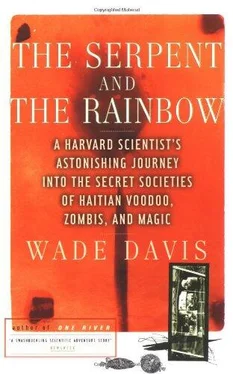Wade Davis - The Serpent and the Rainbow
Здесь есть возможность читать онлайн «Wade Davis - The Serpent and the Rainbow» весь текст электронной книги совершенно бесплатно (целиком полную версию без сокращений). В некоторых случаях можно слушать аудио, скачать через торрент в формате fb2 и присутствует краткое содержание. Год выпуска: 1985, Издательство: Simon & Schuster, Жанр: Старинная литература, на английском языке. Описание произведения, (предисловие) а так же отзывы посетителей доступны на портале библиотеки ЛибКат.
- Название:The Serpent and the Rainbow
- Автор:
- Издательство:Simon & Schuster
- Жанр:
- Год:1985
- ISBN:нет данных
- Рейтинг книги:5 / 5. Голосов: 1
-
Избранное:Добавить в избранное
- Отзывы:
-
Ваша оценка:
- 100
- 1
- 2
- 3
- 4
- 5
The Serpent and the Rainbow: краткое содержание, описание и аннотация
Предлагаем к чтению аннотацию, описание, краткое содержание или предисловие (зависит от того, что написал сам автор книги «The Serpent and the Rainbow»). Если вы не нашли необходимую информацию о книге — напишите в комментариях, мы постараемся отыскать её.
The Serpent and the Rainbow — читать онлайн бесплатно полную книгу (весь текст) целиком
Ниже представлен текст книги, разбитый по страницам. Система сохранения места последней прочитанной страницы, позволяет с удобством читать онлайн бесплатно книгу «The Serpent and the Rainbow», без необходимости каждый раз заново искать на чём Вы остановились. Поставьте закладку, и сможете в любой момент перейти на страницу, на которой закончили чтение.
Интервал:
Закладка:
Even Jean’s oldest son, with his father already having left, did not know the exact location of the Bizango gathering, but following his father’s instructions he led us along a fretted track to a crossroads just south of the town. There we waited. The storm had passed and the trade winds overhead blew away the last wild rage of tattered clouds revealing a night sky deep with stars. The stillness was broken only by the sound of the waves beating the shoreline. When, after close to an hour, the expected contact failed to appear, we swallowed our disappointment and began to make our way slowly back toward Saint Marc. It was just after we turned away from the sea that Isnard heard the sound of the Bizango drums. Leaving him by the roadside, we returned to town to drop off Jean’s son, then immediately doubled back. By then Isnard had discovered the source of the distant rhythms. He led us to an open field enclosed by a living fence of caotchu. At the center of the field stood a complex of low buildings.
Instantly an enormous man bearing the rope bandoliers of the sentinelle stepped before us to plug the gap in the fence. A second guard appeared in the path behind, blocking our rear.
“Who are you?” demanded a harsh anonymous voice.
“Bête Sereine. Animals of the Night,” Isnard replied flatly. The sentinelle moved aside, revealing yet a third Shanpwel, who accosted Isnard by clapping his hands on each of our friend’s shoulders.
“Where are you coming from?” he asked.
“I come from the heel.”
“Where are you going?”
“I’m going into the toes.”
“What toe?”
“I am the fifth.”
“How many stars do you walk with?”
“We are three.” Isnard offered his hand but the gesture was ignored. The arms of the shadowy figure remained firmly anchored to his sides. Rachel moved confidently forward.
“We have come to you by invitation of our friend Jean Baptiste,” she said politely. The man glanced at her suspiciously.
“He expects you and the blanc?”
“Yes, we are late. There was too much rain.” Loosening his hold on Isnard, the man dispatched the sentinelle to take our message into the ceremony. For several awkward minutes we stood quietly, listening to the rhythms of the Bizango drums. Though the temple was but a hundred meters away, the sound was fainter than it had been when we first heard it from the roadside. It was just as Herard had said. “When the Bizango drum beats in front of your door, you hear it as from a great distance, and when it is miles away it sounds as if resonating in your own yard.”
The arrival of a messenger from Jean Baptiste broke the tension. The man’s warm greeting sent the sentinelle and his companions back into the shadows. Chatting idly, then falling silent, we followed the messenger along a narrow path toward the temple. The incessant drumming continued to soften, and as we drew near we heard the words of the song:
The band is out, the society is out,
Watch out mother who made me.
The band’s out, the society is out
Mothers of Children
Tie up your stomachs .
The society was out, its procession winding past some distant crossroads, but the temple was still packed, a catacomb of gestures and faces that seemed vaguely inimical as we eased our way into the crowded entry. To one side in a small open space around the poteau mitan a handful of men and women dipped and swayed, and just beyond, hidden from the light, a group of drummers stood straddling their instruments, teasing the dancers like puppeteers. The music didn’t stop, but the drummers looked up, and their throaty irreverent voices announced our presence in no uncertain terms.
The messenger led us out the back of the temple into a courtyard vibrating with several hundred people. There was a festive air, and all the crowded tables together with the lingering odor of grilled meat and sweet potatoes reminded me at first of a community picnic. But the atmosphere was also charged with tension, somehow accentuated by the loud hissing of dozens of Coleman lanterns set around the periphery of the courtyard. They cast a harsh, almost blinding light that kept my eyes to the ground as Rachel, Isnard, and I wove past a number of tables until we reached the one at the back headed by Jean Baptiste. We were welcomed and invited to sit by his side, but there were no introductions, and when Rachel finished apologizing for our delay and exhausted a few easy phrases of greeting, a disconcerting stillness gripped us. Across the table a half-dozen men sat as still as stones. The light from behind them completely obscured their faces in shadow and reduced their enormous bodies to a single ominous silhouette. I started any number of stories that had always worked in the past but now drew no response. Isnard was equally uncomfortable, yet our presence challenged his pride to display his knowledge of the Bizango, and in a foolish gesture he pulled a demijohn of clairin from his hip pocket and stood up to propose a toast. To make matters worse, the bottle was empty.
“Friends of the night,” he said with inappropriate melodrama, “we are all brothers.”
A flat voice responded from across the table. “What do you mean all brothers?”
“Well,” Isnard stumbled, “we are Haitians, we are all Haitians.” He had intended, of course, to imply that he too was a member of the Bizango.
“Yes, it is so. We are Nég Guinée , the people of Africa,” the shadow agreed. “Some of us.”
Fortunately, before Isnard could go any further, the tables around us began to buzz with the rumor of the returning procession, and within moments the entire courtyard was filled with anticipation. Jean led us quickly into the peristyle, which, already crowded when we arrived, was by now bulging with members of the Bizango. In the distance, seen through the gaps in the bamboo wall, the procession like an articulated serpent crawled over the hills—proceeding, halting, then moving again, slowly emerging out of the nether darkness of the night. Lanterns on either flank floodlit great swirls of chalky dust. You could hear the distant voices, the whistles, and the short barking commands driving the members into line. The crack of sisal whips kept time with the ponderous cadence of the march as the leaders paused to allow the coffin to sway like a pendulum hanging from the shoulders of the escort. To this fusion of red and black, the droning voices lent a certain uniformity binding everyone present to the rhythms of the music.
We come from the cemetery,
We went to get our mother,
Hello, mother the Virgin
We are your children
We come to ask your help
You should give us courage .
As the procession poured into the temple, clusters of lanterns at the entryway outlined the stern faces of the magnificently robed acolytes. First inside was the sentinelle, who leapt around the poteau mitan in a mock display of suspicious concern. Behind him walked a lone man carrying a rope, followed closely by the sacred coffin and its circle of retainers. As the bulk of the society squeezed into the room, the guests pulled back into an adjoining chamber until the enclosure swelled with red-and-black robes. Slowly the procession circled the poteau mitan, but there were so many that the members didn’t walk so much as lean into each other, flesh to flesh, sending a single wave surging around the post. A tall, dazzling woman wearing a satin and spangled Edwardian dress and a buccaneer’s hat complete with ostrich plumes took the center of the room. With slow sweeping gestures she orchestrated the entire movement while her face, half hidden beneath her hat, radiated perfect serenity, a look both world-weary and utterly calm.
Читать дальшеИнтервал:
Закладка:
Похожие книги на «The Serpent and the Rainbow»
Представляем Вашему вниманию похожие книги на «The Serpent and the Rainbow» списком для выбора. Мы отобрали схожую по названию и смыслу литературу в надежде предоставить читателям больше вариантов отыскать новые, интересные, ещё непрочитанные произведения.
Обсуждение, отзывы о книге «The Serpent and the Rainbow» и просто собственные мнения читателей. Оставьте ваши комментарии, напишите, что Вы думаете о произведении, его смысле или главных героях. Укажите что конкретно понравилось, а что нет, и почему Вы так считаете.












